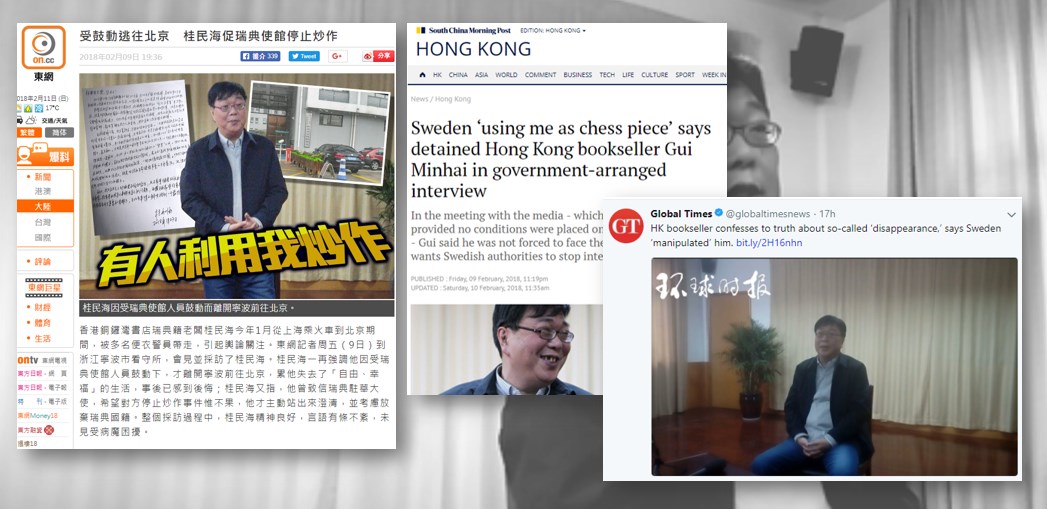Police in China say that detained Swedish bookseller Gui Minhai had planned to illegally pass on multiple documents containing state secrets to overseas groups, according to Chinese tabloid Global Times.
The claim emerged from a press event set up with handpicked media outlets including state-run Xinhua, Global Times and Hong Kong’s Oriental Daily and South China Morning Post. In the “interview” on Friday, Gui – a Chinese-born Swedish citizen – claimed that he wanted Stockholm to stop sensationalising his case and using him as a chess piece: “If they continue to interfere in my affairs, I may consider giving up my Swedish citizenship.”
Video: Gui Minhai speaks out to Chinese media pic.twitter.com/0MDhBXx8NZ
— Global Times (@globaltimesnews) February 10, 2018
Gui denied claims that he was unwell and said he had voluntarily asked to meet the press. The “interview” was held at a detention facility in Ningbo and arranged by the Ministry of Public Security.
In January, Gui was seized by Chinese security personnel in front of Swedish diplomats whilst on a train to Beijing. He was among five Hong Kong-based booksellers who began disappearing in late 2015. Their store, Causeway Bay Books, sold political gossip titles banned in China. Gui first went missing in Pattaya, Thailand with no record of departure, only to re-emerge on Chinese state television months later “confessing” to a decade-old drink-driving incident. The 53-year-old was formally released last October after serving a sentence but remained under strict surveillance at a flat in Ningbo.

Sweden has called for his release and has said that the “interview” had no effect on their stance. Foreign Ministry spokesperson Katarina Byrenius Roslund told Reuters: “This video changes nothing… We continue to demand that our citizen be given the opportunity to meet with Swedish diplomatic staff and medical staff.”
‘Breathtaking’ cruelty
Sophie Richardson, China director for NGO Human Rights Watch said that the video is solid evidence for the prosecution of Chinese official: “The cruelty and coercion here are just breathtaking,” she said on Twitter.
China researcher at NGO Amnesty International, Patrick Poon, said: “This kind of video has become the China’s attempt to divert attention about arbitrary detention. If the person is free to speak, why can’t he have access to a lawyer of his own choice and proper consular access? Can only trust what people say when they’re free and outside China.”
This kind of video has become China’s attempt to divert attention about arbitrary detention. If the person is free to speak, why can’t he have access to a lawyer of his own choice and proper consular access? Can only trust what people say when they’re free and outside China.
— Patrick Poon 潘嘉偉😷🦚 (@patrickpoon) February 9, 2018
Gui’s friend, dissident poet Bei Ling, told AFP that he was very shocked and saddened by the claims: “How can we believe whether the words of someone who is oppressed — like a prisoner — are real?”
Ethical concerns
Journalists and rights activists on Twitter hit out at the Alibaba-owned South China Morning post for publishing the “interview,” video and transcript.
Bill Birtles, China correspondent at the Australian Broadcasting Corporation, tweeted: “Credibility of @SCMP_News, which has been fading under Alibaba ownership, takes another hit. Had some good scoops during 19th Congress, but this reminiscent of ‘interview’ it published w/ then-detained legal assistant Zhao Wei in 2016.”
What on earth is the @SCMP_News doing? To give credence to one of these forced “confessions” from somebody in custody? What a sad indictment of where that newspaper is heading. https://t.co/XLCr9hXSpg
— Stephen McDonell (@StephenMcDonell) February 10, 2018
Swedish human rights activist Peter Dahlin, who was paraded on state TV in 2016 before being released from Chinese custody, tweeted: “[A]mazing what kind of rights detainees have these days in China… @SCMP_News disappoints. Again.”

Senior SCMP reporter Phila Siu, who reported on the Gui media event, defended the decision to publish, saying the newspaper had sought to be as open as possible about the circumstances: “What if the person suddenly screams for help?… If we were not there, u’d nt even kw how this meeting was arranged. There’s no perfect solution to this and I did my best.”
(1/3) There’s this meeting u could go knowing many hv described previous meetings as forced confessions. U could go n ask Qs that needed to be asked, or just stay away n pick up the stories afterwards from other media, which actually happened. But u won’t be getting the full pic.
— Phila Siu (Bobby) (@phila_siu) February 10, 2018
In 2016, the paper came under fire from press freedom groups for publishing an “interview” with detained Chinese activist Zhao Wei in which she claimed she regretted her activism.
HKFP has contacted Gui’s daughter for comment.
